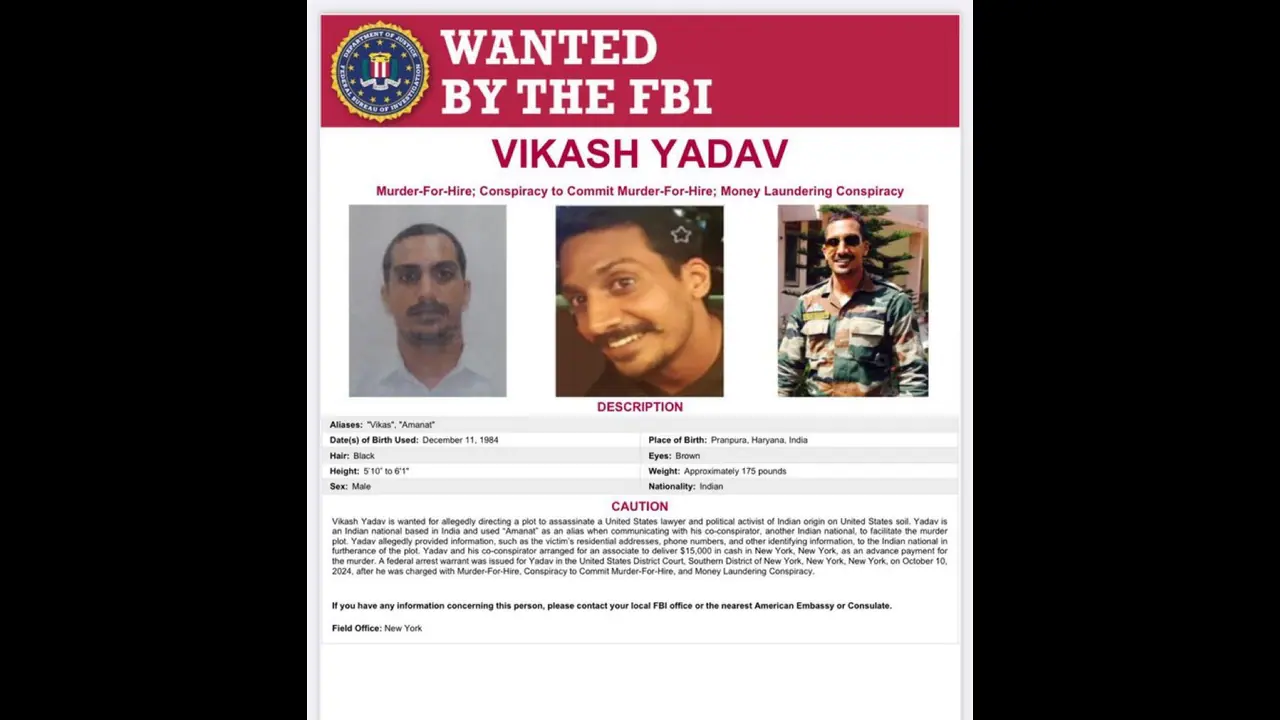The US has officially charged an ex-Indian intelligence officer, Vikash Yadav, in connection with a thwarted assassination plot targeting Khalistani terrorist Gurpatwan Singh Pannun in New York City last year.
In a major development that could escalate diplomatic tensions, the US Justice Department has announced criminal charges against Vikash Yadav, an Indian government employee specializing in intelligence, in connection with a foiled plot to assassinate Gurpatwant Singh Pannun, a Khalistani terrorist residing in New York City.

The indictment, unsealed on Thursday, accuses Yadav, 39, of orchestrating a murder-for-hire plot intended to eliminate Pannun, a vocal advocate for a sovereign Sikh state, and subsequent planned killings of other individuals. Prosecutors allege that this operation was part of a broader scheme to carry out politically motivated murders in both the United States and Canada.
This revelation comes during a period of heightened tensions between India and Western nations, particularly the US and Canada. Yadav’s indictment, which was announced in Washington while members of an Indian inquiry committee were in the US capital for discussions, further strains relations. Just days earlier, Canadian Prime Minister Justin Trudeau accused India of targeting Sikh separatists in Canada, leading to the expulsion of diplomats by both nations.
In response to the indictment, FBI Director Christopher Wray stated, “The FBI will not tolerate acts of violence or other efforts to retaliate against those residing in the US for exercising their constitutionally protected rights.” The criminal charges are part of ongoing efforts to hold accountable those involved in politically motivated violence.
The plot was first made public in 2023, when US prosecutors charged Nikhil Gupta, an Indian national, with conspiracy to orchestrate the assassination of Pannun. Gupta was arrested in Prague and extradited to the US in June 2024.
The new indictment claims that Yadav, who was employed by India’s Cabinet Secretariat at the time, recruited Gupta to arrange the killing of Pannun, offering $100,000 for the assassination. Of this sum, $15,000 was reportedly delivered to a confidential source working with the Drug Enforcement Administration (DEA), who was posing as a criminal associate.
The indictment further claims how Yadav provided Gupta with Pannun’s personal information, including his home address, phone numbers, and daily movements in New York. Gupta reportedly passed this intelligence to the DEA’s undercover source, while Yadav is said to have maintained close contact with Gupta, requesting regular updates and surveillance photographs of the intended target.
Authorities believe the murder plot was to take place just days after the June 2023 assassination of Hardeep Singh Nijjar, another Sikh activist, in Surrey, British Columbia. US prosecutors have indicated that Yadav and Gupta’s plan included additional killings, targeting at least four individuals by June 29, 2023.
According to US State Department spokesman Matthew Miller, Indian officials informed American authorities that Yadav is no longer employed by the Indian government. “We are satisfied with cooperation. It continues to be an ongoing process,” Miller added. However, the incident adds to the already strained diplomatic relations between India and the West.
India’s foreign ministry has dismissed Canada’s accusations related to the Nijjar case as “absurd” and responded with the expulsion of several Canadian diplomats, a move mirrored by Canada earlier in the week.
In the wake of the indictment, Gurpatwant Singh Pannun issued a statement lauding US authorities for their commitment to protecting citizens. “The US government has reassured its commitment to the fundamental constitutional duty to protect the life, liberty, and freedom of expression of US citizens at home and abroad,” Pannun said. He condemned the assassination attempt as “India’s transnational terrorism” and a direct challenge to US sovereignty and democratic values.
Pannun further emphasized the contrast between the tactics of his pro-Khalistan movement and the actions of the Indian government, stating, “India believes in using bullets while pro-Khalistan Sikhs believe in ballots.”
